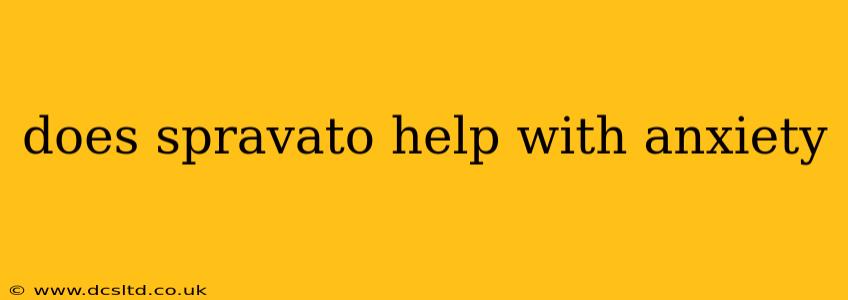Spravato, the brand name for esketamine, is a nasal spray medication gaining attention for its potential in treating treatment-resistant depression. While primarily known for its antidepressant effects, there's growing interest in its potential role in managing anxiety. This article explores the current understanding of Spravato's use for anxiety, addressing common questions and highlighting the limitations of the existing research.
What is Spravato (Esketamine)?
Spravato is an intranasal (nasal spray) form of esketamine, an isomer of ketamine. Unlike ketamine, which affects both NMDA and other receptors, esketamine's effects are primarily targeted at NMDA receptors in the brain. These receptors play a crucial role in regulating glutamate, a neurotransmitter implicated in mood disorders and anxiety. By modulating glutamate activity, esketamine may help alleviate symptoms of depression and potentially anxiety.
Does Spravato Treat Anxiety Directly?
Currently, Spravato is not FDA-approved for the treatment of anxiety disorders. Its primary indication is for treatment-resistant depression in adults who haven't responded to at least two other antidepressant treatments. However, anecdotal evidence and some preliminary research suggest a potential benefit for certain anxiety conditions, particularly in individuals with comorbid depression and anxiety. More research is needed to definitively determine its efficacy and safety for anxiety alone.
Can Spravato Help with Anxiety Associated with Depression?
This is where some of the most promising research lies. Many individuals with depression experience significant anxiety symptoms. In these cases, studies indicate that Spravato might alleviate both depressive and anxiety symptoms simultaneously. The improvement in depressive symptoms may indirectly lead to a reduction in associated anxiety. However, it's crucial to remember that this is not a direct treatment for anxiety; the anxiety relief is often secondary to the antidepressant effect.
What are the Side Effects of Spravato for Anxiety?
Because Spravato is not approved for anxiety, the specific side effect profile for its use in anxiety is not fully established. However, side effects observed in clinical trials for depression often include:
- Dissociation: Feeling detached from reality or oneself.
- Sedation: Feeling drowsy or sleepy.
- Nausea: Feeling sick to the stomach.
- Increased blood pressure: Temporary elevation of blood pressure.
- Headache: Pain in the head.
- Dizziness: Feeling lightheaded.
These side effects are often transient and generally subside within a few hours. It's vital to discuss potential side effects with a healthcare professional before starting Spravato treatment.
Is Spravato Safe for Long-Term Use for Anxiety?
Long-term safety data specifically for anxiety treatment using Spravato is limited. The FDA-approved treatment for depression involves a series of treatments under medical supervision, often followed by maintenance therapy. The long-term effects of using Spravato for anxiety are not yet fully understood and require further investigation.
What are the Alternatives to Spravato for Anxiety?
Numerous other treatments are available for anxiety, ranging from therapy to medication. These include:
- Cognitive Behavioral Therapy (CBT): A type of psychotherapy that helps individuals identify and change negative thought patterns and behaviors.
- Exposure Therapy: Gradually exposing individuals to feared situations or objects to reduce anxiety.
- Selective Serotonin Reuptake Inhibitors (SSRIs): A common class of antidepressants often used to treat anxiety disorders.
- Serotonin-Norepinephrine Reuptake Inhibitors (SNRIs): Another class of antidepressants that can be effective for anxiety.
- Benzodiazepines: A class of medications that can provide rapid relief from anxiety symptoms, but are typically used short-term due to potential for dependence.
It's crucial to discuss treatment options with a mental health professional to determine the most appropriate approach based on individual needs and circumstances.
Conclusion:
While promising, the use of Spravato for anxiety remains largely investigational. While it might offer benefits for individuals with comorbid depression and anxiety, it's not a currently approved treatment for anxiety disorders alone. Always consult a qualified psychiatrist or healthcare provider to discuss your anxiety symptoms and determine the best course of treatment for your specific situation. They can assess your individual needs and guide you toward effective and safe management strategies. Self-treating is strongly discouraged.
